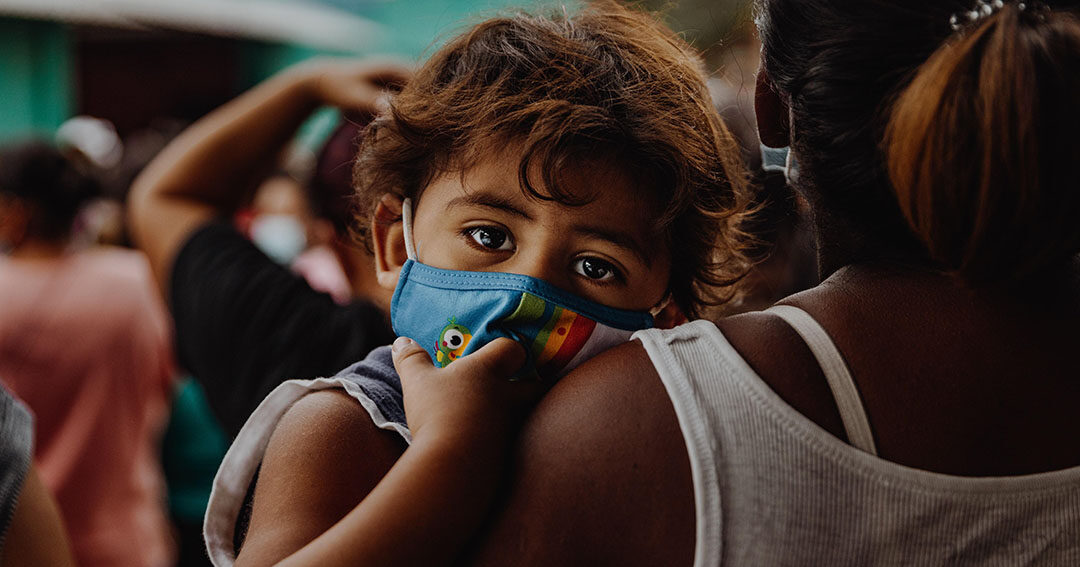National COVID-19 Resiliency Network (NCRN)

NCRN Resource Flyer
Alliant/NCRN Resource Links
NCRN provides resources to communicate, connect and collaborate.
The Morehouse School of Medicine National COVID-19 Resiliency Network (NCRN) coordinates a strategic and structured network of national, state/territorial/tribal and local public and community-based organizations that will mitigate the impact of COVID-19 on racial and ethnic minority, and rural populations. The National COVID-19 Resiliency Network is part of the U.S. Department of Human and Health Services Office of Minority Health’s National Infrastructure for Mitigating the Impact of COVID-19 within Racial and Ethnic Minority Communities (NIMIC).

We’re excited to continue to partner as we work together to mitigate the negative impact of COVID-19 on communities.
We welcome all organizations and individuals to join the National COVID-19 Resiliency Network to access COVID-19 resources. Organizations are encouraged to use the resources for their dissemination efforts to communities they work with. Community members are encouraged to share the resources with their families and friends.
The Alliant Health NCRN Strategic Partnership team is proud to continue to be a partner in Morehouse School of Medicine’s three-year, National COVID Resiliency Network (NCRN) project, supported by the Office of Minority Health.

National COVID-19 Resiliency Network (NCRN) Resources
Health Equity
- COVID Vaccine Demographics Trends
- Community Chronic Conditions Health Equity Guide
- National Influenza Vaccine Disparities Toolkit
- Rural Telehealth Toolkit
- Applying A Framework to Advance Health Equity
- Health Equity Assessment Guide
- Health Related Social Needs Screening
- Toolkit for People with Disabilities
- CDC Multilingual Toolkit
- Equity in Health Care and Improving Chronic Conditions
- Equity in Vaccine Access – English
- COVID-19 Vaccine Equity: Best Practices for Community and Faith Based Organizations
Long COVID-19
Health & Wellness
- COVID-19 Self Management Zone Tool
- Equity in Health Care and Improving Chronic Conditions
- Equity in Vaccine Access – English
- Grief and Loss in Children and Teens During COVID-19
- Toolbox of T’s
- Practicing the Pause
- Mindfulness Moment - Video
- Mindfulness Moment - Flyer
- It’s Ok to Ask for Help – Flyer
- It’s OK to Ask for Help – Video
- Healthy Families
- COVID-19 and Your Resilience
- What is Counseling and Telehealth: Series
- 4-7-8 Breathing
- School Engaging Parents in Social Emotional Learning: Dr. Ann Shillingford
- Grief and Loss – Bite Size Learning
- You Matter: Coping During COVID Flyer
- NCRN Hypertension on the Body Flyer
- Practice the Pause
- Keep Your Mind Grounded – Flyer
- Relax, Refresh…Reset
- AHS Adult Immunization Flyer
- AHS-NCRN ESRD Immunization Flyer
- Long COVID Self-Care Toolkit
Correctional Facilities
Mental Wellness & Screening Tools
- State of Mental Health in America
- PHQ-9 Questionnaire and Scoring
- Mental Health America Website
- Coping with Coronavirus: Dealing with Daily Stress, Anxiety, and a Range of Other Emotions
- NIMH Chronic Illness & Mental Health – English
- NIMH Chronic Illness & Mental Health – Spanish
- De-escalation Toolkit
- Behavioral Health Screening Work Flow for Dialysis Centers
- Using Motivational Interviewing to Increase COVID-19 Vaccines
- NCRN – Depression Self-Management Zone Tool – English
Alliant Created Resources
Translated Resources
- NCRN – What Am I Sick With? (Spanish)
- NCRN COVID-19 Vaccine Myths and Facts – Spanish
- ESRD Immunization Flyer – Spanish
- Equity In Vaccine Access – SPANISH (Translated Video in Spanish)
- Equity In Vaccine Access – SAMOAN (Translated Video in Samoan)
- AHS-Relax Refresh Reset – Spanish
- NCRN – Depression Self-Management Zone Tool – Spanish
- NCRN Resource Links – Spanish
Supported Training Videos
- Trauma Informed Care Virtual Training (Part 1)
- Trauma Informed Care Virtual Training (Part 2)
- Columbia Suicide Severity Rating Scale Training (C-SSRS)
- Effective Ways to Manage the Traumatic Experience of COVID-19
- Using Motivational Interviewing to Increase COVID-19 Vaccinations: Practical Application
- Using Motivational Interviewing to Increase COVID-19 Vaccinations
- Managing Psychological Distress During COVID-19
- Psychological First Aid Presentation (Recording)
Flyers & Infographic Library
- Hand Hygiene for Your Health: Catch Some Waves
- Hand Hygiene for Your Health: Hello Sunshine, Goodbye Germs
- NCRN We Can Do This – Get Vaccinated
- NCRN We Can Do This – Get Vaccinated (Spanish)
- Hop Into Spring With a Healthy Hand Hygiene Routine
- CDC COVID-19 Bridge Access Program
- NCRN – What Am I Sick With? (English)
- NCRN Hand Hygiene for the Holidays: Tis the Season
- NCRN COVID-19 Vaccine Myths and Facts
- For the Love of Mine
- Long COVID Self-Care Toolkit
- Long COVID on the Body – Flyer
- Alliant Health – NCRN Produced Resources
- De-escalation Toolkit
- Behavioral Health Screening Work Flow for Dialysis Centers
- You Matter: Coping During COVID Flyer
- Mindfulness Moment
- It’s Ok to Ask for Help – Flyer
- NCRN Hypertension on the Body Flyer
- Practice the Pause
- NCRN Resource Links – English
- Keep Your Mind Grounded – Flyer
- AHS-Relax Refresh Reset – English
- NCRN – Depression Self-Management Zone Tool – English
- AHS Adult Immunization Flyer
- Using Motivational Interviewing Flyer
- AHS-NCRN ESRD Immunization Flyer
Video Library
- NCRN Celebration: Building Alliances and Partnerships
- Mental Wellness Umbrella Video
- Equity in Health Care and Improving Chronic Conditions
- Grief and Loss in Children and Teens During COVID-19
- Toolbox of T’s
- Practicing the Pause
- Mindfulness Moments
- It’s OK to Ask for Help – Video
- Healthy Families
- COVID-19 and Your Resilience
- What is Counseling and Telehealth: Series
- 4-7-8 Breathing
- School Engaging Parents in Social Emotional Learning: Dr. Ann Shillingford
- Grief and Loss – Bite Size Learning
- Self-Care Video
- Equity in Vaccine Access – English
NCRN Newsletters
- NCRN June 2023 Newsletter
- NCRN May 2023 Newsletter
- NCRN April 2023 Newsletter
- NCRN March 2023 Newsletter
- NCRN February 2023 Newsletter
- NCRN January 2023 Newsletter
- NCRN December 2022 Newsletter
- NCRN November 2022 Newsletter
- NCRN October 2022 Newsletter
- NCRN September 2022 Newsletter
- NCRN August 2022 Newsletter
- NCRN July 2022 Newsletter
- NCRN June 2022 Newsletter
- NCRN May 2022 Newsletter
- NCRN April 2022 Newsletter
- NCRN March 2022 Newsletter
- NCRN February 2022 Newsletter
- NCRN January 2022 Newsletter
- NCRN December 2021 Newsletter
- NCRN November 2021 Newsletter
NCRN Monthly Resource One-Pagers
October 2023
April 2022
March 2022
Helplines and Help Text Lines
• Disaster Distress Helpline 1-800-985-5990 or text TalkWithUs to 66746 SAMHSA’s Disaster Distress Helpline provides 24/7, 365-day-a-year crisis counseling and support to people experiencing emotional distress related to natural or human-caused disasters. https://www.samhsa.gov/find-help/disaster-distress-helpline
• 988 Suicide and Crisis Lifeline. Dial 988 Línea de Prevención del Suicidio y Crisis 1-888-628-9454. Free and confidential support for people in distress 24/7. https://988lifeline.org/talk-to-someone-now/
• National Center for PTSD Crisis Line 1-800-273-8255 https://www.veteranscrisisline.net/get-help/chat
• National Helpline 1-800-662-HELP (4357) SAMHSA’s National Helpline is a free, confidential, 24/7, 365-day-a-year treatment referral and information service (in English and Spanish) for individuals and families facing mental and/or substance use disorders. https://www.samhsa.gov/find-help/national-helpline
• Crisis Text Line The Crisis Text hotline is available 24 hours a day, seven days a week throughout the U.S. The Crisis Text Line serves anyone, in any type of crisis, connecting them with a crisis counselor who can provide support and information (text HELLO to 741741)